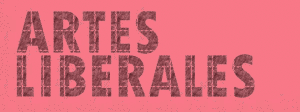Artes Liberales 2014: Art & Tech-Knowledgies: the spaces of mediation
From February 6 to March 2, 2014, the Ў Gallery (Minsk) is to host the ARTES LIBERALES exhibition and educational project for the third time.
ARTES LIBERALES is an artistic and educational experiment aimed at understanding the significance of the humanities education and the necessity to study liberal arts in the today’s society.
ARTES LIBERALES is a festival of ideas and art projects created by young people studying liberal arts and attempting to offer their own view of the world around us and the ways to interpret it through art and other media.
ARTES LIBERALES is a series of public lectures, workshops and round table discussions delivered by prominent Belarusian and European professors and lecturers. The program of academic events as part of the project has an interdisciplinary character and encompasses the broad humanities realm (theory and history of visual arts, gender studies, philosophy, social sciences, urban studies, cultural heritage and museum studies, media theory and other fields of studies).
For three weeks, the Ў Gallery space will virtually turn into an Open University – accessible to each and everyone. An introduction to the traditions and the recent tendencies in social sciences and humanities will be offered through the synthesis of intellectual practices and creative projects.
In 2014, the project’s theme is Art+Science+Technology, or a “triple alliance” of art, science and technology in the space of the digital culture.
What do an artist’s studio, a laboratory, a film or photo studio, a scientist’s study room and a university classroom have in common? All of these are spaces for searching, experimenting and discovering.
What unites art, science and technology? Poesis, ability to imagine, desire to explore the world and make it better.
Although, despite their common origin (τέχνη) and congenial evolution, the relations between them have never been simple. Science attempted to get rid of the random and “obvious;” art tried to defend its right for a non-utilitarian view of the world; poetry and “the positive knowledge” drifted further and further apart; and technologies, being products of human activities, eventually subjugated social reality.
Meanwhile, the “digital turn” has facilitated de-hermitization of these “parallel universes”, and resulted in transforming both the ways knowledge is created and the forms it is popularized.
Thus, our project is a sui generis laboratory model of collaboration between different communities and of communication between isolated types of knowledge – within the academy and beyond it; between representatives of various social sciences and humanities, between theorists and practitioners in the sphere of hi-tech culture; between “technogeeks” and artists.
The program includes:
Round table discussions: “Digital Challenge: the future of humanities”, “Knowledge Society” before “Knowledge Society”: the popularization of sciences in USSR”, “What kind of science and technology museum does Belarus need?”, “New distance learning technologies,” “Between academic journalism and popular sociology,” “The World of Tanks: battles for history?”, “Medialization and medicalization of culture: how is the history of art possible in the Internet age, or is a spectator always a patient?”, “New reproductive technologies and problematization of the boundary between the natural and the artificial in the human experience”
A series of lectures: “Medialization of knowledge in interdisciplinary contexts,” “University and new technologies,” “Art and Fantasy: from a fairy tale to science-fiction”, “Love and sexuality between art and science”
24hSolaris: audiovisual installation
Workshops: “Visualization of uninteresting objects,” “Rewriting children’s fairy tales: gender for princesses and princes,” “Urban Audio Video Rhythms”
Papa washed a window: an exhibition of gender-sensitive design
“Science-Fiction and Cinema”: screening of experimental popular science films and science fiction movies with live soundtrack by electronic musicians from Belarus and Latvia
Presentations of new publications in social sciences and humanities
Project participants:
Alain Fleischer (France), Andres Kurg (Estonia), Leonid Lozner (Belarus), Arturas Bukauskas (Lithuania), Pavel Tereshkovich (Belarus), Galina Orlova (Russia), Victoria Musvik (Russia), Ekaterina Lapina-Kratasiuk (Russia), Alla Sokolova (Belarus), Andrei Gornykh (Belarus), Tatiana Shchyttsova (Belarus), Olga Shparaga (Belarus), Maxim Zhbankov (Belarus), Ala Pihalskaya (Belarus), Felix Ackermann (Germany/Lithuania), Volha Hapeyeva (Belarus), Hanna Shadryna (Belarus), Pavel Niakhayeu \ Pavel Ambiont (Belarus), Volha Salakheyeva \ VJ Solar Olga (Belarus), Ales Tsurko (Belarus), Harmash aka I/DEX (Belarus), Echochorus (Latvia), Alexei Sfourds (Belarus) and other invited lecturers, artists and musicians.
Movies – as a form of social utopia
Art – on the wall and on the screen
Science – and its life beyond the laboratory
LiveCinema – Works-Events
Electronic music – our acousmatic future
And the gallery – as the meeting point
Project author and curator: Almira Ousmanova
Coordinator: Aliaksei Barysionak
Curators of the audiovisual program: Pavel Niakhayeu, Volha Salakheyeva
Curator of the student projects exhibition: Tatsiana Kulazhenko
Press conference: 6 February, 18:00
Opening: 6 February, 19:00
The program

